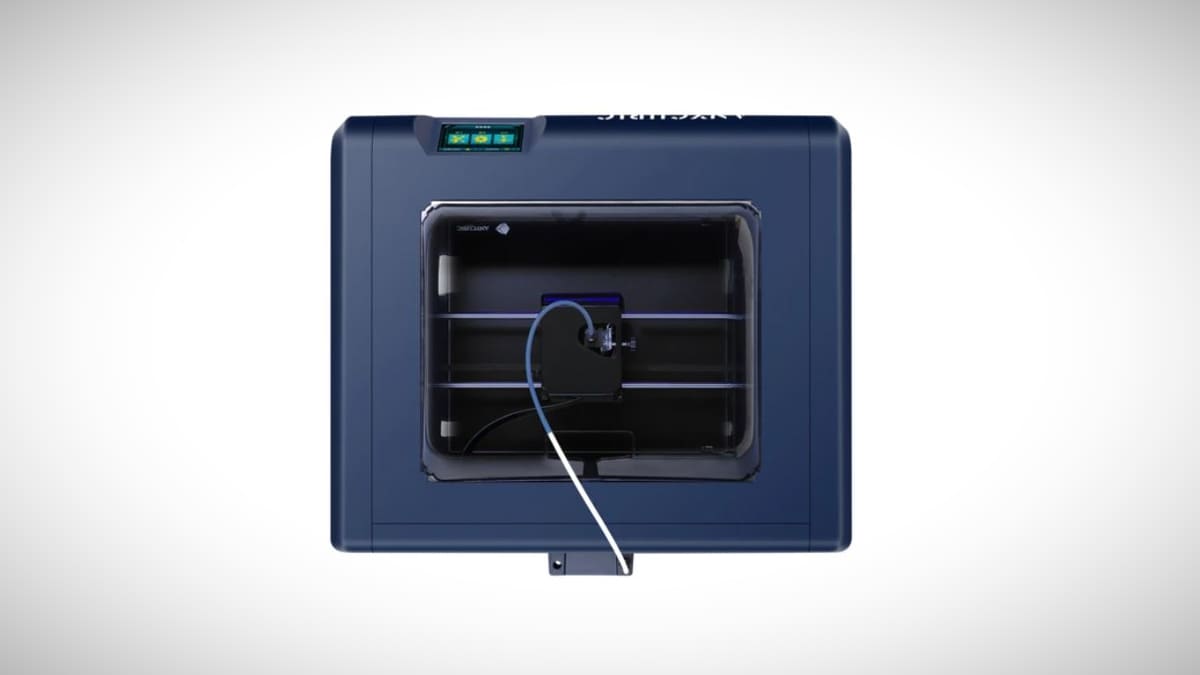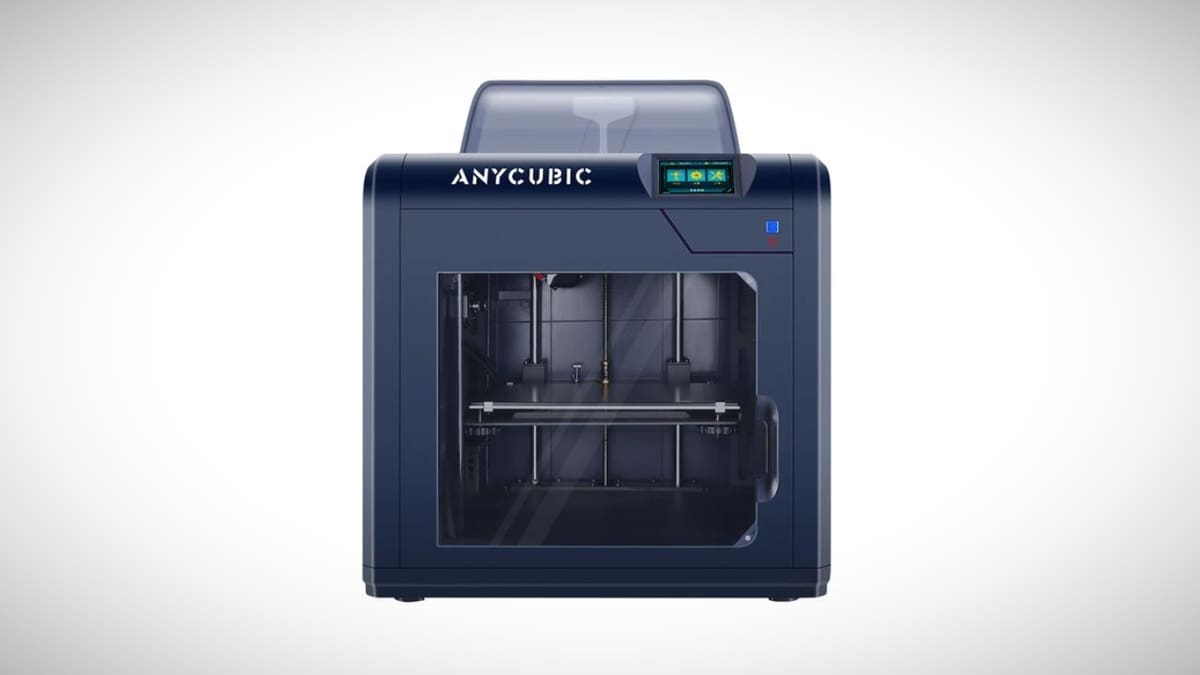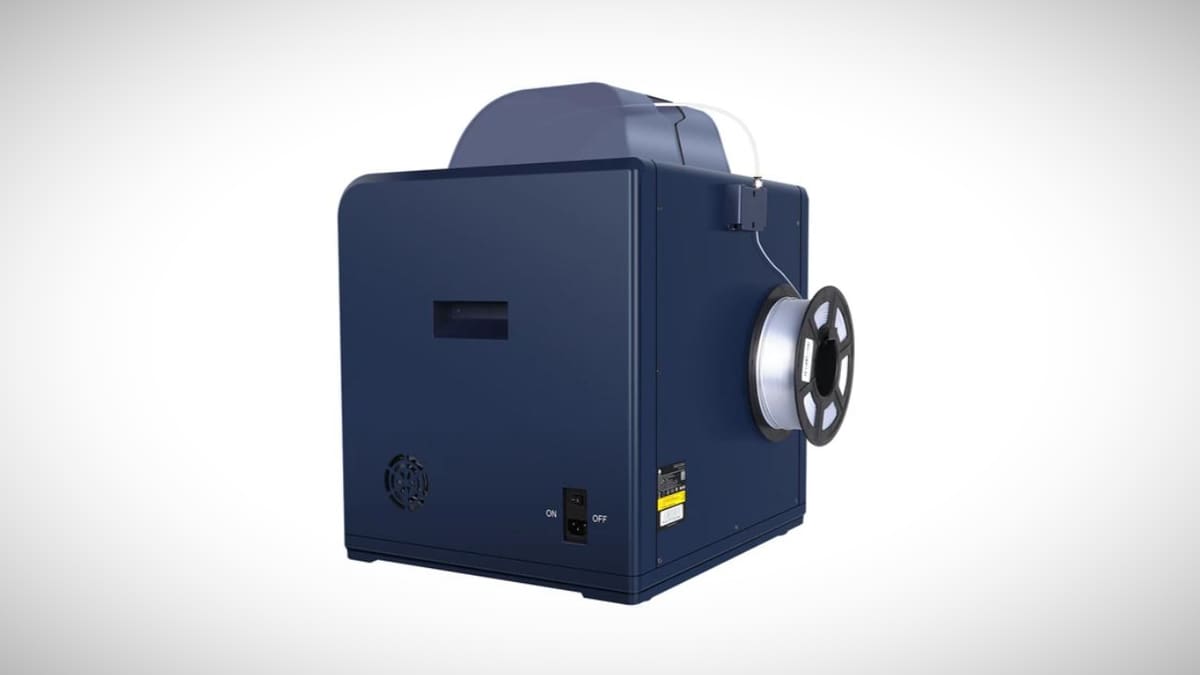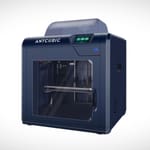Without even the slightest hint of experimentation or deviation, AC/DC has made every single one of their 17 studio albums sound exactly the same. They released another one last year. It was the fastest-selling album of 2020 in the UK, US, and Australia. If you’ve heard one AC/DC song, you’ve basically heard all of them. So, why do people still get excited about their new stuff?
Anycubic has gone a little AC/DC on us with the new 4Max Pro 2.0 — it is practically the same as the outgoing 4Max Pro.
It has the same temperature limits, the same layer resolution, a smaller overall build volume, and a higher price than the model it replaces.
So, what’s really new about this printer? Well, there are one or two key differences. Read on to find out.
Features

Back In Black
For the return of the 4Max, Anycubic has given it a stealthy, almost murdered-out look. You have to say, it looks like it means business, but that’s not exactly the most important feature for a 3D printer, so let’s skip any further fashion critiquing and get into some proper printy bits.
Dual-gear extrusion
Having dual-gear extrusion and a direct drive setup can be a ticket to greater consistency from your extruder, minimizing slippage as well as being a superior method of dealing with flexibles. It’s an upgrade many 3D printer owners like to DIY on their machines, so the fact it comes as standard on the 4Max Pro 2.0 is just a nice little bonus.
Silent Stepper Drivers
TMC2208’s stepper drivers are present in the second 4Max Pro, which should keep the noise down a little, but whether this printer is super quiet depends on a lot more than just the steppers. A fan would also play a significant role in that, and oh, speak of the devil…
Upgraded Fan
There’s an upgraded fan, or rather two, to be precise, found on the 2.0’s print head, and Anycubic says it can reduce the printing head’s vibration and thereby improve the printing stability. No word on how noisy it is, but if it’s a big, beefy, super fan, it probably won’t be all that quiet. Let’s wait and see.
Dual Z-axis motors
Dual often means better in 3D printing. Dual extruders, dual-gear extrusion, and dual z-axis motors. More often than not, two is a bit better than one. In the case of z-axis motors, it means greater stability, with a motor on each side ensuring that vibrations are distributed evenly through the frame, as well as providing a more precise and synchronous movement of the plate.
Reduced build area
Overall, there’s slightly less space to play within the 4Max Pro 2.0. This new version has a build volume of 270 x 210 x 190 mm, whereas the outgoing model had 270 x 205 x 205 mm. Anycubic claims in marketing copy that this is a large build volume, but they neglect to mention it’s less than what you had before, so we’re doing that for them.
No Change Here
Quite a few things haven’t changed at all between the 2.0 and the previous 4Max Pro. It has the same temperature limits of 260 °C at the hot end and 100 °C on the bed, the same layer resolution at 0.05-0.3 mm, the same connectivity, USB, SD card, the same manual bed leveling, and the same recommended print speed.
Really, you have to say that not a great deal has changed, apart from the price…

Price

You can order a new 4Max Pro 2.0 right now, and currently, you’ll find Anycubic listing it at $499 on the official Anycubic website. Some other retailers have it in stock on their websites and are asking a fair bit more for it than that, so, for the time being, at least, Anycubic directly seems to be your most wallet-pleasing bet.

Reviews
It’s still early days for comprehensive and informative reviews on the 4Max 2.0. The previous model was received fairly well, though, and Anycubic has a very positive reputation in the realm of 3D printing.
Do be aware that reviews on shopping sites are not necessarily genuine, regardless of what they might say. There’s a lot of shady stuff out there, folks. Salt pinches at the ready.

Tech Specs

GENERAL SPECS
- Technology: FDM
- Year: 2021
- Assembly: Fully Assembled
- Mechanical arrangement: Cartesian-XY
- Manufacturer: Anycubic
MATERIALS
- Filament diameter: 1.75 mm
- 3rd party filaments: Yes
- Compatible materials: ABS, TPU, PLA, HIPS
3D PRINTING PROPERTIES
- Layer height: 0.05-0.3 mm
- Feeder system: Bowden
- Extruder type: Single nozzle
- Nozzle size: 0.4 mm
- Max. build volume: 270 x 210 x 190 mm
- Max. extruder temperature: 260 ℃
- Max. heated bed temperature: 100 ℃
- Max. print speed: 150 mm/s (50 mm/s recommended)
- Closed print chamber: Yes
- Bed leveling: Manual
- Print bed: “Ultrabase” Glass
- UI: 3.5-inch color touchscreen
- Connectivity: USB, SD card
- Built-in camera: No
- Resume print: Yes
- Filament sensor: Yes
SOFTWARE
- Recommended slicer: Cura, Repetier-Host, Simplify3D
- Operating system: Windows /Mac OSX / Linux
- File types: STL, OBJ, JPG, PNG
DIMENSIONS AND WEIGHT
- Frame dimensions: 454 x 466 x 535 mm
- Weight: 18.8 kg

Similar Machines
Qidi Tech X-Pro
Hear us out here, yes, it’s a bit more expensive at around $650, but the Qidi Tech X-Pro is an enclosed, smart-looking 3D printer with dual-extrusion. No other printer here has that particular trick up its sleeve, so if you can sacrifice a little more cash and a little space on the print bed, then this machine could be a fun alternative to the 4Max Pro 2.0.
Creality CR-200B
Creality’s recent addition to this area of the market is the CR-200B, another well-dressed 3D printer that’s fully enclosed. It comes in around the same price as the 4Max Pro 2.0, but it can’t quite match it for layer resolution and build space, though it does have 10 mm more in height at least.
Monoprice MP Voxel
The smallest build volume here, but available at a bargain price, the Monoprice MP Voxel is a printer we grew fond of during the time we spent together. It’s fully enclosed too, but there is a chance that this printer might be starting to show its age now, being much smaller overall and missing one or two of the more appealing features of the 4Max Pro 2.0. Still, an impressive little printer.
License: The text of "Anycubic 4Max Pro 2.0: Specs, Price, Release & Reviews" by All3DP is licensed under a Creative Commons Attribution 4.0 International License.
CERTAIN CONTENT THAT APPEARS ON THIS SITE COMES FROM AMAZON. THIS CONTENT IS PROVIDED ‘AS IS’ AND IS SUBJECT TO CHANGE OR REMOVAL AT ANY TIME.



